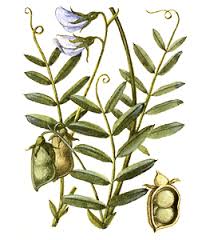 Once when Jacob was cooking some stew, Esau came in from the open country, famished. Esau told Jacob, "Let me gobble down some of this red stuff, since I'm starving." But Jacob said, "First sell me your birthright." Esau said, "Behold, I am about to die; so of what use then is the birthright to me?” Genesis 25: 29-31 Jacob’s brother Esau was a hunter, not for him the life of a tiller of soil, a farmer governed by the agricultural cycle. Esau was most at home in the wilderness, a wily tracker, steeped in the habits and habitats of wild creatures, skilled at stalking his prey and bringing game back to the family hearth. He would have ranged for miles in the hot desert scrub in pursuit of his quarry, and some days he came home with nothing, dusty, thirsty and famished. And on one of those days, there was that lazy twin brother, mother’s favorite, the gardener, taking his ease in the comfort of the camp while stirring a pot of lentil stew! Jacob had no trouble tricking Esau out of his birthright, because Esau’s stomach was in charge of his decisions on that day. Lentils, Lens ensculenta, are pulses, small members of the pea family that have been grown as a food crop in the Near East for at least 10,000 years, since Paleolithic times. Most familiar to many of us are the brown lentils we use in soups, but they can also be red, yellow and green, with different flavors and textures. Nutty-flavored, rich in protein, and nutritious, lentils are grown in the Biblical Garden, in a pot that is purposely taller than our rabbits can jump. The Religious School children particularly like to plant them because they are larger than most seeds, and they enjoy seeing them doubled in their dried pods in the fall, when they are collected and deposited in the seed bank for next season. Similarly we plant two other pulses in a raised bed: broad beans (aka fava beans), and, of course, chickpeas, all important staples of the Israelite diet. But back to the "birthright": the Google definition is twofold: · a particular right of possession or privilege one has from birth, especially as an eldest child or, · a natural or moral right, possessed by everyone. Our history, our faith and the values we learned from our parents is the birthright we give our children and grandchildren. At our best, we pass it on with intention, and we enlist family and community to help impart the extraordinary importance of the heritage that shapes so much of who our children are and will become. It is a solemn task and it is a privilege. It is our legacy, and some day it will be theirs as well. L’dor va dor. |
AuthorsMichael Schlesinger is Temple Sinai’s Biblical Gardener. Mike has been gardening since he was eight years old. He used to grow grape vines and make wine when he lived in California. He now tends to our garden, continuing the traditions started by Catherine Walters. Archives
March 2020
|

Affiliated with the Union for Reform Judaism
30 Hagen Avenue • Cranston, RI 02920 • 401-942-8350 Office: dottie@templesinairi.org Rabbi Jeffrey Goldwasser: [email protected] |
Want to sign up for the weekly Sinai Scroll email?
Click here to receive weekly updates on Temple services, events and a message from the Rabbi. |


